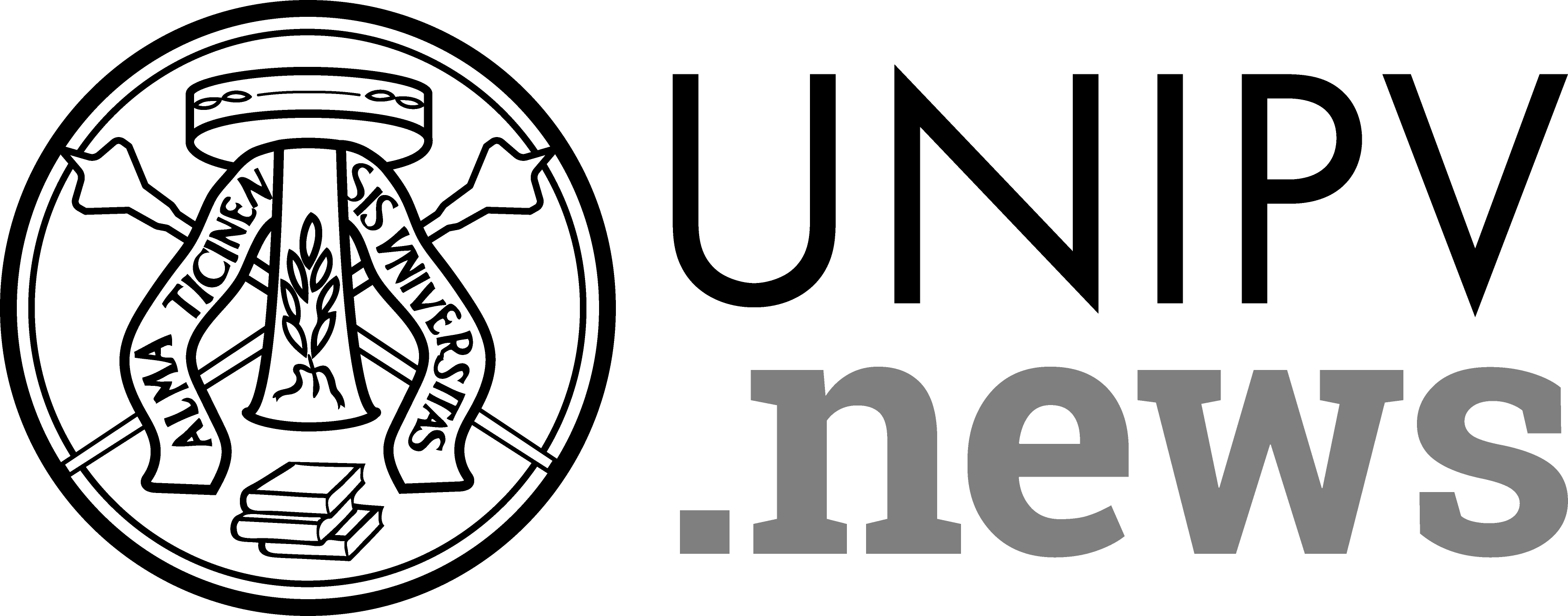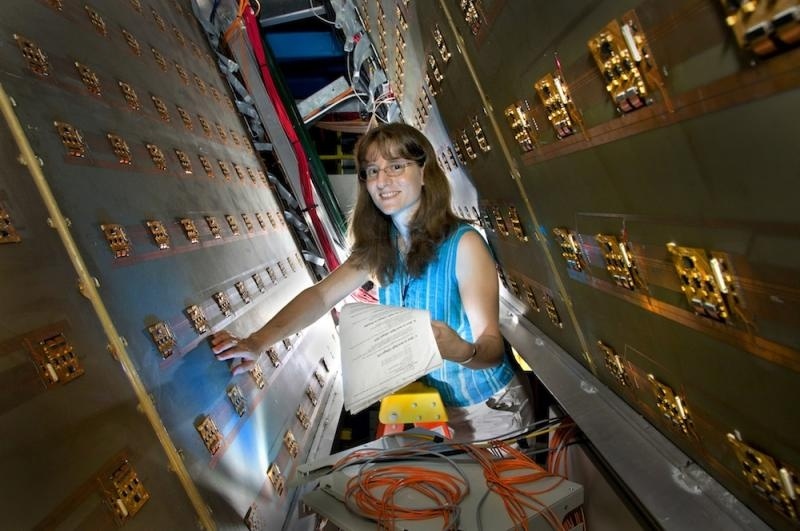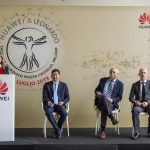Il Dipartimento di Stato degli Stati Uniti e il Consiglio della J. William Fulbright Foreign Scholarship sono lieti di annunciare che la prof.ssa Christine A. Aidala dell’Università del Michigan ha ricevuto una borsa di studio come Fulbright U.S. Scholar in Italia nel campo della fisica. La prof.ssa Aidala lavorerà presso il Dipartimento di Fisica dell’Università di Pavia e collaborerà con l’Istituto Nazionale di Fisica Nucleare (INFN). (English below)
L’attività di ricerca prevista contribuirà allo sviluppo di un esteso programma di studio dell’interazione nucleare forte, che tiene insieme i nuclei atomici, presso l’esperimento Large Hadron Collider Beauty (LHCb) del Centro Europeo di Ricerca Nucleare (CERN). In particolare, la prof.ssa Aidala studierà fenomeni sensibili allo spin, una proprietà quantistica tipica di tutte le particelle fondamentali, in collaborazione con il gruppo locale di esperti in questo campo, prof. Alessandro Bacchetta, prof. Barbara Pasquini e dott. Marco Radici dell’INFN.
La prof. Aidala è una dei più di 800 cittadini statunitensi che insegneranno, condurranno ricerca e/o offriranno la loro competenza all’estero durante l’anno accademico 2019-2020 attraverso il Programma Fulbright U.S. Scholar. I vincitori delle borse Fulbright sono selezionati sulla base sia dei loro risultati accademici e professionali sia dei loro precedenti di servizio e di leadership nei rispettivi campi di attività.
Il programma Fulbright è il principale programma di scambio educativo internazionale del governo degli Stati Uniti ed è stato progettato per creare connessioni durature tra il popolo degli Stati Uniti e il popolo di altri paesi.
Il programma Fulbright è finanziato attraverso uno stanziamento annuale fatto dal Congresso degli Stati Uniti al Dipartimento di Stato degli Stati Uniti. Anche i governi partecipanti e le istituzioni ospitanti, le società e le fondazioni di tutto il mondo forniscono supporto diretto e indiretto al Programma, che opera in oltre 160 paesi in tutto il mondo.
Dalla sua istituzione nel 1946 con una legge introdotta dal defunto senatore americano J. William Fulbright dell’Arkansas, il programma Fulbright ha dato a oltre 390.000 studenti, studiosi, insegnanti, artisti e professionisti di ogni provenienza e campo l’opportunità di studiare, insegnare e condurre ricerche, scambiare idee e contribuire alla ricerca di soluzioni di questioni di interesse internazionale.
I borsisti Fulbright affrontano sfide globali critiche in tutte le discipline, costruendo relazioni, conoscenze e leadership a sostegno degli interessi a lungo termine degli Stati Uniti. I borsisti Fulbright si sono distinti in molti campi: 59 hanno ricevuto il premio Nobel, 84 hanno ricevuto il premio Pulitzer e 37 hanno servito come capi di stato o di governo.
Per ulteriori informazioni sul programma Fulbright o sul Dipartimento di Stato degli Stati Uniti, visitare il sito http://eca.state.gov/fulbright o contattare l’ufficio stampa dell’Ufficio per gli Affari Educativi e Culturali al telefono + 1-202-632-6452 o e-mail ECA-Press@state.gov.
***
Christine A. Aidala Receives Fulbright U.S. Scholar Award to Italy to study the strong nuclear force
The U.S. Department of State and the J. William Fulbright Foreign Scholarship Board are pleased to announce that Professor Christine A. Aidala of the University of Michigan has received a Fulbright U.S. Scholar Program award to Italy in physics. Aidala will perform research at the Department of Physics of the University of Pavia and collaborate also with the Italian Institute of Nuclear Physics (INFN).
The planned activity is part of a project to develop an expanded program for the Large Hadron Collider Beauty (LHCb) experiment at the European Centre for Nuclear Research (CERN) to study aspects of the strong nuclear force, which holds atomic nuclei together. In particular, she will investigate processes sensitive to spin, a quantum mechanical property of all fundamental particles, in collaboration with the local group of experts in this field, Prof. Alessandro Bacchetta, Prof. Barbara Pasquini, and Dr. Marco Radici from INFN.
Aidala is one of over 800 U.S. citizens who will teach, conduct research, and/or provide expertise abroad for the 2019-2020 academic year through the Fulbright U.S. Scholar Program. Recipients of Fulbright awards are selected on the basis of academic and professional achievement, as well as record of service and demonstrated leadership in their respective fields.
The Fulbright Program is the U.S. government’s flagship international educational exchange program and is designed to build lasting connections between the people of the United States and the people of other countries. The Fulbright Program is funded through an annual appropriation made by the U.S. Congress to the U.S. Department of State. Participating governments and host institutions, corporations, and foundations around the world also provide direct and indirect support to the Program, which operates in over 160 countries worldwide.
Since its establishment in 1946 under legislation introduced by the late U.S. Senator J. William Fulbright of Arkansas, the Fulbright Program has given more than 390,000 students, scholars, teachers, artists, and professionals of all backgrounds and fields the opportunity to study, teach and conduct research, exchange ideas, and contribute to finding solutions to shared international concerns.
Fulbrighters address critical global challenges in all disciplines, while building relationships, knowledge, and leadership in support of the long-term interests of the United States. Fulbright alumni have achieved distinction in many fields, including 59 who have been awarded the Nobel Prize, 84 who have received Pulitzer Prizes, and 37 who have served as a head of state or government.
For further information about the Fulbright Program or the U.S. Department of State, please visit http://eca.state.gov/fulbright or contact the Bureau of Educational and Cultural Affairs Press Office by telephone +1-202-632-6452 or e-mail ECA-Press@state.gov.




